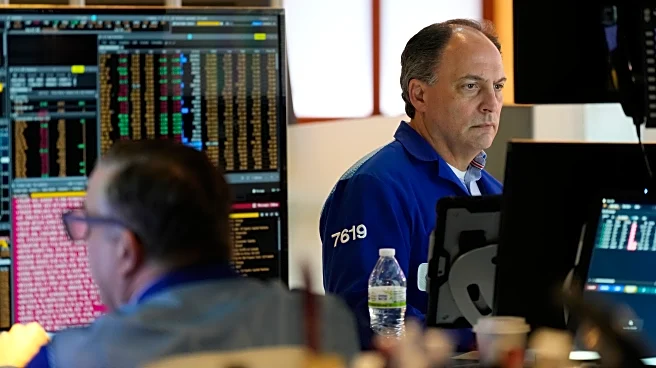What's Happening?
The latest Consumer Price Index (CPI) figures indicate that UK inflation has increased to 3.8% as of August 2025, with food inflation reaching 4.9%. This rise in inflation is affecting consumer confidence and retail spending, as households face higher costs for their weekly shopping. According to the BRC-Opinium Consumer Sentiment Monitor, consumer confidence in the economy slightly improved to -32 in August, up from -33 in July. However, the sentiment remains significantly lower than a year ago, with older generations experiencing the largest declines. Full-time workers are more optimistic about their financial situation compared to part-time staff, the unemployed, or retirees. The British Retail Consortium (BRC) CEO Helen Dickinson noted that rising food prices are likely to continue impacting consumer sentiment negatively.
Why It's Important?
The increase in inflation and food prices is significant as it directly affects household budgets and consumer spending patterns. With inflation predicted to rise further, households may need to allocate more of their income to essential goods, particularly groceries. This shift could impact the retail sector, as discretionary spending may decrease. The situation underscores the importance of government intervention, particularly in reducing business rates to stimulate investment in retail, hospitality, and leisure sectors. The Chancellor's plans for these sectors are crucial for revitalizing Britain's high streets and town centers, which have been struggling with economic uncertainty and reports of large businesses facing administration.
What's Next?
As inflation continues to rise, the focus will be on the Chancellor's upcoming plans to address the economic challenges faced by the retail, hospitality, and leisure sectors. A significant reduction in business rates could be a key factor in encouraging investment and boosting consumer confidence. Stakeholders in these industries will be closely monitoring government actions and their potential impact on economic recovery. Additionally, households will need to adjust their spending habits in response to rising prices, which could lead to changes in retail market dynamics.
Beyond the Headlines
The ongoing inflationary pressures highlight broader economic challenges, including supply chain disruptions and extreme weather conditions affecting food production. These factors contribute to the rising costs and may require long-term strategies to ensure economic stability. The situation also raises ethical considerations regarding the affordability of essential goods for lower-income households, potentially exacerbating social inequalities.










